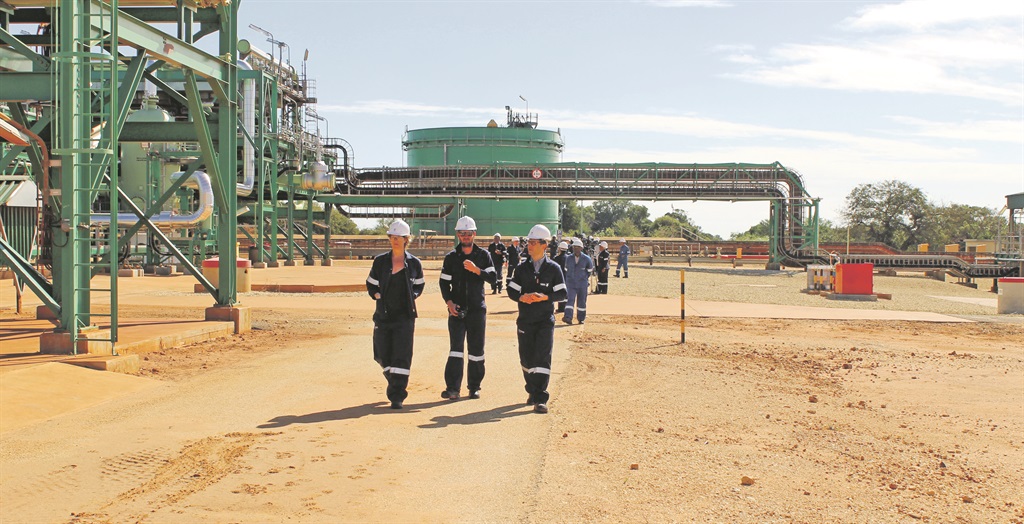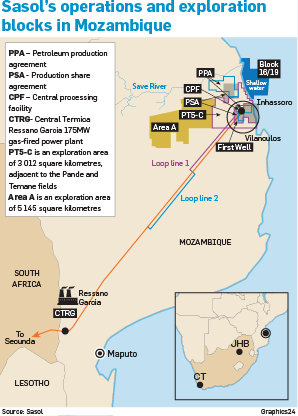
Firm will spend billions to drill 13 onshore exploration wells to expand natural gas operations in Mozambique
Sasol is planning to spend about $260 million (R4 billion) to drill 13 onshore exploration wells as part of the expansion of its Mozambique natural gas operations.
John Sichinga, Sasol Exploration and Production International senior vice-president, said this week in Vilankulo during a tour of Sasol’s natural gas operations that onshore wells cost about $20 million each, which would indicate that 13 wells would cost $260 million.
The drilling work on the first of the 13 wells started on May 26 and it could take up to 50 days to complete it.
The wells are drilled to a depth of 2 000m. The drilling of all of them could continue until the third quarter of 2018.
“It is quite a complex reservoir, so we are developing it in tranches. So, the first tranche is the 12 wells, plus a water well,” Sichinga said.
This is all part of the $1.4 billion first phase of the production share agreement, which is an oil, liquefied petroleum gas (LPG) and gas project next to Mozambique’s existing petroleum production agreement area at the Pande and Temane gas fields.
The $1.4 billion in production share agreement expenditure will be spent in tranches, including building a 20 000-tons-a-year LPG facility, the cost of drilling the wells and the expansion of the central processing facility in Temane. The first phase of agreement will also include the building of a facility to process 15 000 barrels of oil a day.
Subsequent phases of the production share agreement are dependent on the outcome of geological and geophysical information obtained during the drilling campaign.
The first phase of the production share agreement project is expected to take several years to complete.
Construction of the liquid process facility, which will produce the LPG and oil, will start in the first quarter of next year.
The first production of oil is expected to take place from mid-2019 and the first output of gas will follow soon thereafter.
The Mozambique government approved the production share agreement in January, after which Sasol commissioned a drilling rig from French drilling contractor Société de Maintenance Pétrolière.
Sasol first spent $1.2 billion on the natural gas operation and that investment grew to $2 billion before the production share agreement investment.
During the first investment, Sasol’s natural gas operations produced 122 million gigajoules a year.
Sasol started producing natural gas in 2004 and today it delivers gas to 320 customers, mainly in South Africa, and five resellers.
The natural gas output is delivered to South Africa though an 865km pipeline.
By the end of June next year, the company’s natural gas output will have grown to 197 million gigajoules, up nearly 8% from 183 million gigajoules-a-year capacity.
Sichinga said adding an extra 60 million gigajoules of annual production could cost about $100 million, based on the previous expansion in 2012.
After the next production share agreement phase is complete, Sasol’s natural gas production will rise to 236 million gigajoules.
The early work for the new production share agreement has cost $50 million.
The extra production is expected to be sold to a planned 400 megawatt gas-to-power plant based in Mozambique. However, for this project to go ahead, transmission lines need to be built.
Sichinga said that if this 400MW plant didn’t go ahead, the extra production could be sold to Sasol’s customers in South Africa and Mozambique.
However, in the meantime, Sasol is drilling and proving that there is gas in the ground before proceeding further with the production share agreement.
Part of the gas supply is sold to customers in Mozambique, including two power plants in Ressano Garcia that produce a total capacity of 295MW.
Sasol has built a 175MW gas-fired power plant together with Mozambican power utility Electricidade de Moçambique, while Gigawatt Mozambique has a 120MW gas-fired power plant. They are both based at Ressano Garcia.
The initial dispensation that started natural gas production was the petroleum production agreement, which saw Sasol, together with Companhia Moçambicana de Hidrocarbonetos, the government’s vehicle for participation in the project, and the International Finance Corporation (5%) develop the Pande and Temane gas fields.
Sasol is the only company that is producing oil and gas in Mozambique. However, companies, including Exxon Mobil, Total, Eni and Anadarko Petroleum, have exploration properties in Mozambique, but aren’t producing any gas or oil.
Right now, Mozambique is Africa’s fifth-largest natural gas producer behind Algeria, Egypt, Nigeria, Libya and Equatorial Guinea.




 Publications
Publications
 Partners
Partners









